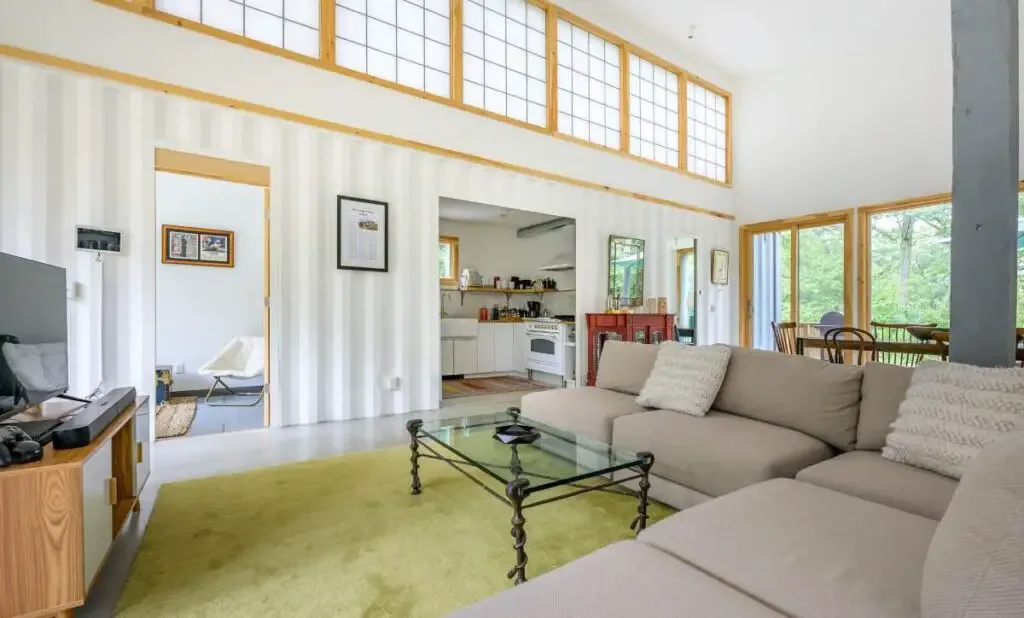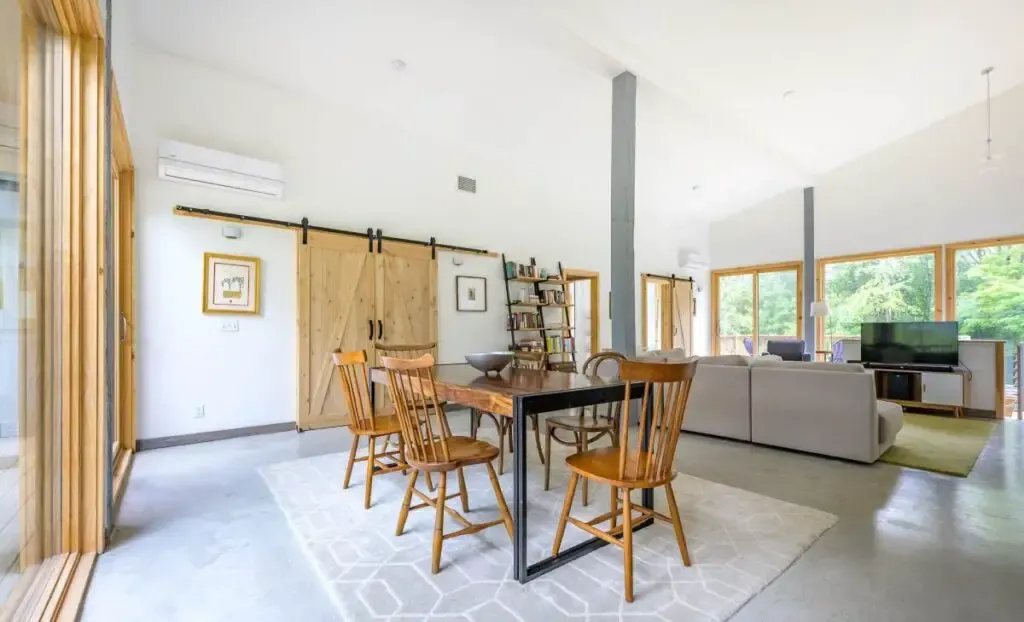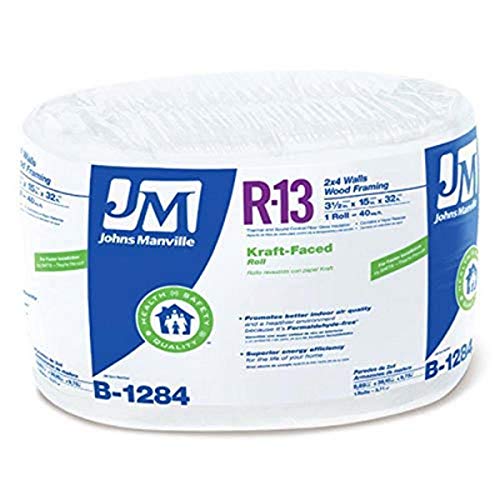Are you looking for a unique and eco-friendly housing option in Massachusetts? Consider building a container home! Container homes, also known as cargo homes or shipping container houses, have been gaining popularity across the country due to their innovative design, versatility, and sustainable nature.
In this article, we will explore the concept of container homes, discuss their rising popularity and numerous benefits, and delve into why they are an attractive choice for housing in Massachusetts.
Table of Contents
Building Regulations and Permits for Container Homes in Massachusetts

When it comes to building a container home in Massachusetts, there are certain regulations and permits you need to be aware of. Ensure that you follow the guidelines below to ensure a smooth and hassle-free construction process.
Overview of Massachusetts Building Regulations and Codes
Massachusetts has implemented strict building regulations and codes to ensure the safety and integrity of residential structures. These regulations apply to all types of homes, including container homes.
It is essential to understand and comply with these regulations to avoid any legal issues and to ensure the longevity of your container home.
Specific Requirements for Container Homes
In addition to standard building regulations, container homes in Massachusetts must meet specific requirements. This includes:
- Structural stability: Container homes must be designed to withstand the local climatic conditions and be able to withstand stress from high winds and heavy snow loads.
- Insulation: Adequate insulation must be installed in container homes to provide a comfortable interior environment and comply with energy efficiency standards.
- Electrical and plumbing systems: Container homes must adhere to electrical and plumbing codes to ensure the safety of occupants and the overall functionality of the home.
- Fire safety: Proper fire safety measures, such as the installation of smoke detectors and fire extinguishers, must be included in container homes to prevent and handle potential fire hazards.
Read More on Building A Shipping Container Home In Germany: Good or Bad?
Permits and Approvals Needed for Constructing a Container Home in Massachusetts
Before starting the construction of a container home in Massachusetts, you will need to obtain several permits and approvals. This may include:
- Building permit: A building permit is required to ensure that your container home complies with local building codes and regulations.
- Zoning approval: You may need to obtain zoning approval to determine if container homes are allowed in the specific area where you plan to build.
- Utility connections: You will need to coordinate with utility companies to obtain approvals for connecting your container home to the necessary services like water, electricity, and sewage.
- Environmental considerations: Depending on the location, you may need to obtain environmental permits related to land use, conservation, or other environmental factors.
It is recommended to consult with a professional architect or contractor who is familiar with the local regulations and permitting processes to ensure compliance and a smooth construction journey.
Read More on How To Get Permits For Container Homes In Florida
Design and Architecture for Container Homes in Massachusetts

A. Customization Options
Container homes in Massachusetts offer incredible design flexibility and versatility. With the ability to stack, connect, and modify shipping containers, you have endless possibilities to create a unique living space that suits your taste.
When it comes to personalization, container homes provide a canvas for your creativity. You can explore various creative ways to add your personal touch, from selecting vibrant exterior paint colors to incorporating artistic elements like murals or graffiti. Your container home can truly be a reflection of your personality, making it stand out in the Massachusetts landscape.
To inspire you, here are some showcase examples of unique container home designs in Massachusetts:
- A Cozy Retreat: There are container homes in Massachusetts designed with sleek wooden interiors, large windows, and a rooftop garden, providing a tranquil oasis amidst the bustling city.
- The Green Haven: An eco-friendly container home with a living roof, solar panels, and rainwater harvesting system, showcasing sustainability at its finest.
- The Industrial Chic: A container home that embraces its industrial roots, featuring exposed brick walls, metal accents, and a minimalist interior that exudes modern sophistication.
Read More on Building Inspection Adelaide: Ensuring Safety and Quality
B. Structural Considerations

While designing your container home, it is crucial to ensure its stability and durability. Structural considerations play a significant role in creating a safe and long-lasting living space.
Additional components can be incorporated into the design to enhance insulation and weatherproofing. This includes adding insulation panels on the container walls, installing energy-efficient windows, and utilizing sustainable roofing materials.
By integrating these elements, you can create a comfortable and energy-efficient container home that can withstand the Massachusetts climate.
However, it’s important to strike a balance between design aesthetics and structural integrity. Collaborating with experienced architects and engineers can help you achieve a seamless integration of both aspects, ensuring that your container home not only looks visually appealing but also meets the necessary safety standards.
Read More on Why Building Inspections in Queensland are Crucial: Expert Guide
Construction Process and Materials for Container Homes in Massachusetts
A. Building with Shipping Containers
1. Sourcing and Procuring Containers
Tips for choosing the right shipping containers:
- Consider the size and number of containers needed for your project.
- Inspect containers for any signs of damage or rust.
- Make sure containers are compatible with local building codes.
Evaluating the condition and quality of containers:
- Check for any dents, holes, or structural issues.
- Ensure the doors and locks are in proper working condition.
- Verify that the containers have been properly cleaned and sanitized.
Resources for purchasing or renting containers in Massachusetts:
- Contact local container suppliers, such as XYZ Container Company.
- Explore online platforms like ContainerHub or Rent-a-Container.
- Consider reaching out to shipping companies for container availability.
2. Modifying and Preparing Containers
Necessary modifications for residential living:
- Plan the layout and design of your container home.
- Consider adding windows, doors, and insulation for comfort.
- Install electrical and plumbing systems as per local regulations.
Cutting, welding, and reinforcing containers:
- Hire professional welders and contractors for precise modifications.
- Ensure structural integrity by reinforcing weak points.
- Use appropriate cutting tools and techniques to avoid damage.
Expert insights on container modifications in Massachusetts:
- Consult with experienced container home builders, like ABC Builders.
- Seek guidance from architects or engineers familiar with container construction.
- Join local container home communities or forums for advice and recommendations.
Read More on The Importance of Site Surveys in Construction: Expert Advice
B. Construction Materials and Techniques
1. Foundation Options
Choosing suitable foundation types for container homes:
- Consider options like concrete slabs, pier foundation, or helical piles.
- Evaluate soil conditions and local building codes for appropriate choices.
- Consult with a structural engineer for expert guidance.
Compliance with Massachusetts foundation requirements:
- Ensure foundations meet the state’s regulations and standards.
- Obtain necessary permits for foundation construction.
- Hire licensed contractors for foundation work.
Cost considerations for different foundation options:
- Compare prices of various foundation materials and labor costs.
- Factor in long-term maintenance and durability.
- Seek quotes from multiple contractors for competitive pricing.
Read More on An Excellent Guide for Shipping Container Home Foundation
2. Insulation and Energy Efficiency
Best practices for insulating container homes in Massachusetts:
- Utilize high-quality insulation materials to minimize heat loss.
- Consider spray foam insulation or rigid panel insulation.
- Eliminate air gaps and seal all joints and openings.
Eco-friendly and energy-efficient insulation materials:
- Opt for materials with high R-values and low environmental impact.
- Explore options like recycled denim insulation or cellulose insulation.
- Consult with green building experts for sustainable choices.
Achieving energy efficiency through windows, doors, and ventilation systems:
- Select energy-efficient windows with low U-values and proper sealing.
- Install insulated doors to minimize heat transfer.
- Incorporate passive ventilation strategies for fresh air circulation.
Read More on 5 Amazing Ways To Insulate A Shipping Container Home
| Image | Product Title | Features | Price |
|---|---|---|---|
 | Buy on Amazon | ||
 | Buy on Amazon | ||
 | Buy on Amazon |
Cost-Effective Housing Options: Container Homes in Massachusetts
Container homes are a unique and cost-effective housing option that is gaining popularity in Massachusetts. Not only are these homes visually appealing, but they also offer a practical and affordable solution for those looking to build their dream home.
In this section, we will explore the cost benefits of opting for a container home over a traditional home in Massachusetts.
Comparative Analysis of Costs
When it comes to building a home, cost is always a major factor. Container homes offer a significant advantage in terms of affordability.
A comparative analysis of costs between container homes and traditional homes in Massachusetts reveals that container homes typically require a lower investment.
The cost of materials, labor, and construction is considerably lower for container homes, making them an attractive option for budget-conscious individuals.
Read More on Importance of Building Inspection Before Purchasing a Property
Cost-Saving Strategies and Budgeting Tips
If you are considering a container home project in Massachusetts, it is essential to implement cost-saving strategies and efficient budgeting. One of the most effective ways to save money is by repurposing shipping containers.
These containers are readily available and can be bought at a fraction of the cost of traditional building materials. Additionally, opting for a simpler design and layout can help reduce construction expenses without compromising functionality.
Another cost-saving strategy is to consider second-hand containers. These containers may have minor wear and tear but can be refurbished at a lower cost than purchasing new ones. By being resourceful and strategic in your choices, you can make significant savings throughout the construction process.
Estimating the Total Cost
Estimating the total cost of building a container home in Massachusetts depends on various factors, including the size of the home, design complexity, and additional features.
While it is challenging to provide an exact figure, it is possible to create a rough estimate based on average market rates and project requirements.
It is recommended to consult with professional container home builders or contractors who specialize in this type of construction.
They can provide accurate estimates based on your specific needs and guide you through the process of budgeting for your container home project in Massachusetts.
Read More on Building Inspections in West Auckland: Safety and Compliance
DIY Projects and Professional Builders in Massachusetts
A. DIY Projects for Container Homes
Looking to build your own container home in Massachusetts? Here’s a step-by-step guide to help you get started:
- Essential tools and equipment: Before you begin, make sure you have all the necessary tools and equipment, such as welding machines, cutting torches, and power tools.
- Preparation, assembly, and finishing stages: Start by preparing the site and foundation for your container home. Then, follow the assembly instructions for connecting the containers and adding necessary structural components. Finally, finish the interior and exterior of the home according to your design preferences.
- Safety precautions and recommendations: Throughout the DIY construction process, it’s crucial to prioritize safety. Wear appropriate protective gear, follow safety guidelines, and seek professional assistance if needed.
Read More on Container Pools Brisbane – Discover the Brilliance
B. Hiring a Professional Container Home Builder in Massachusetts
If you prefer to leave the construction to professionals, consider hiring a container home builder in Massachusetts. Here are some tips to help you find the right one:
- Researching reputable container home builders: Start by researching reputable container home builders in Massachusetts. Look for companies with experience in container home construction and positive customer reviews.
- Interview questions and considerations when hiring: When interviewing potential builders, ask about their previous projects, certifications, and licenses. Inquire about their familiarity with local building codes and regulations as well.
- Examples/portfolio of container home builders in Massachusetts: Request examples or portfolios of container home projects they have completed in Massachusetts. This will give you an idea of their style, quality of work, and attention to detail.
Read More on What is 4 Way Inspection? The Ultimate Guide
Sustainable Living with Container Homes in Massachusetts
Container homes provide not only affordable housing options but also contribute to sustainable living practices. Here are some of the environmental benefits of container homes:
- Reduced waste: By repurposing shipping containers, we are preventing them from ending up as waste in landfills. This reduces the environmental impact associated with the manufacturing and disposal of traditional building materials.
- Efficient energy usage: Container homes can be designed to be energy-efficient. With proper insulation, ventilation, and the use of renewable energy sources, container homes can significantly reduce energy consumption.
- Water conservation: Implementing sustainable practices like rainwater harvesting and greywater recycling can help container home dwellers conserve water resources.
- Minimal carbon footprint: Constructing container homes requires fewer construction materials and processes compared to traditional homes. This leads to a smaller carbon footprint and less environmental impact.
Incorporating sustainable practices into container home projects is essential for maintaining eco-friendly living. Some ways to achieve this include:
- Green roofing: Installing green roofs with vegetation not only improves insulation but also helps mitigate stormwater runoff.
- Solar panels: Adding solar panels to container homes can harness clean and renewable energy, reducing reliance on conventional power sources.
- Rainwater harvesting: Collecting rainwater for household use reduces reliance on municipal water supplies and conserves water resources.
Promoting an eco-friendly lifestyle is crucial within container home communities. Some communal practices can help achieve this:
- Community gardens: Encouraging residents to grow their own produce reduces food miles and fosters a sense of community.
- Composting: Implementing composting programs within container home communities reduces organic waste and produces nutrient-rich soil for gardens.
- Public transportation accessibility: Supporting and advocating for easy access to public transportation reduces reliance on individual vehicles, reducing carbon emissions.
Sustainable living with container homes in Massachusetts not only benefits the environment but also creates a healthier and more conscientious community.
Conclusion
Building a Container Home in Massachusetts offers numerous advantages for those looking for cost-effective and sustainable housing options.
In this guide, we have explored the various aspects of constructing a container home in Massachusetts, including building regulations, design and architecture, construction process and materials, and DIY projects.
Recapping the advantages of building a container home in Massachusetts, we find that it provides an affordable housing solution without compromising on quality and style.
Container homes are not only environmentally-friendly but also highly durable and resistant to extreme weather conditions. Additionally, they offer flexibility in terms of design and can be customized to meet the unique needs and preferences of individuals and families.
Key takeaways for successfully constructing a container home in Massachusetts include obtaining the necessary permits and ensuring compliance with building regulations.
It is essential to consult professionals and experienced builders who specialize in container homes to guide you through the design and construction process. By carefully selecting appropriate construction materials and leveraging sustainable practices, you can create a comfortable and eco-friendly living space.
Looking to real-life success stories of container homes in Massachusetts provides inspiration and motivation. Numerous individuals and families have successfully built container homes that have not only met their housing needs but have also become unique and captivating architectural marvels.
These success stories demonstrate that container homes can be both functional and aesthetically pleasing.
In conclusion, building a container home in Massachusetts offers an affordable, sustainable, and creative housing solution.
By carefully considering the building regulations, design, and construction process, you can create a beautiful and eco-friendly living space that meets your unique needs and contributes to sustainable living in Massachusetts.
Read More on How to Adhere to Legal Weight Limits for 40′ Shipping Container

